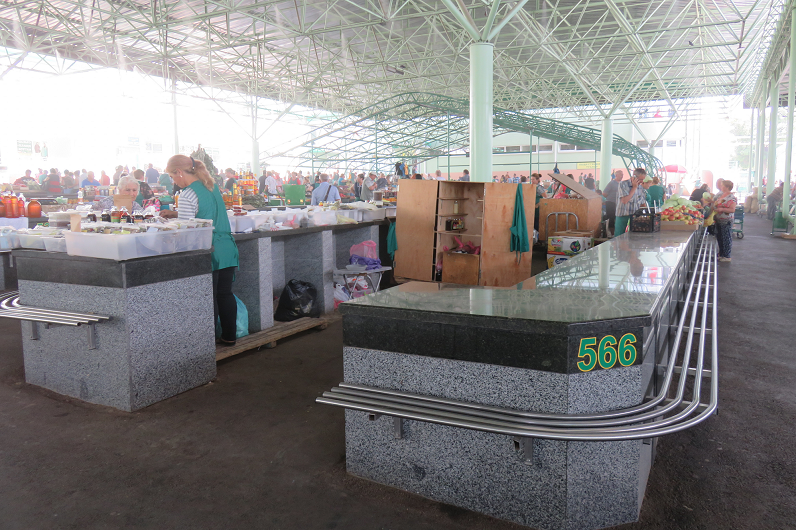
- This event has passed.
WORKSHOP: The Political Economy of Unrecognised Statehood
October 17, 2023 @ 9:00 am - October 18, 2023 @ 6:00 pm UTC+1

Foto: Tiraspol, Transnistria, 2019 © Sabine von Löwis
Workshop convenors: Lena Pieber (ZOiS),Sabine von Löwis (ZOiS), Julia Langbein (ZOiS)
The dissolution of the USSR and the emergence of secessionist entities on its former territories have led to new forms of economic (dis-)integration processes in the region. Despite having a strongly contested status, de facto states managed to adapt to an isolationist environment and develop different strategies to ensure their economic endurance. Depending on their economic structure, the breakaway territories derive profits from trade, receive essential assistance from a patron, and structure property rights regimes. Shadow economy serves as a further central element for resource extraction. In addition, patron states tend to function as intermediaries for their international transactions.
However, while the legal, political and military dimensions have been in the centre of academic analysis, the economic aspects of unrecognised statehood and the entangled relationship between the de facto state with its patron and parent state still appear under-researched. Lack of data and limited access make it difficult to trace and analyse economic practices. Against this background the workshops invites shorter memos and/or full-fledged papers dealing with the following (interrelated) topics and questions:
- Methodological approaches to analysing (informal) economic practices of de facto states: What kind of statistical data is accessible to assess the state of the economy in de facto state? What alternative methods can be used? How to study shadow economies?
- Integration/dis-integration of de facto states in the world market: How do changing economic relations/changing economic interdependencies of de facto state with the outside world affect the relationship with patron- and mother-state and beyond? How independent can de facto states act when (dis-) integrating with transnational markets and value chains and what explains variation?
- Relationship between economic practices and/or relations of de facto states and conflict dynamics: How can economic adaptation and negotiation processes in conflict situations be empirically recorded? How do these strategies affect the attitudes of involved actors towards the conflict? How and in which way do economic activities lead to cooperative dynamics and when do they enforce conflict? What are the economic interests and dependencies of the conflicting parties?
Programme
Tuesday, 17 October 2023
9:30–10:45 Methodological approaches to analysing economic practices of de facto states
Between exclusion and exploitation: migrant labour in a de facto state (Mete Hatay)
Unrecognised states, territories, people, economies: can we really separate them? (Abel Polese)
Chair: Sabine von Löwis (ZOiS)
10:45–11:15 Coffee Break
11:15–13:00 Methodological approaches to gaining and assessing data on de facto states’ economy
De facto states and COVID-19: New comparative insights into capacity to act (Eiki Berg)
De facto stats: finding and contextualising socio-economic indicators about post-Soviet de facto states (Giorgio Comai)
Conceptualising economic agency within the ambit of de facto statehood (Lena Pieber)
Chair: Geza Tasner (FSU Jena)
13:00–14:00 Lunch
14:00–16:00 Integration/dis-integration of de facto states in the world market Strategies of isolation and dis-isolation vis-a-vis and by unrecognised states (Giulia Prelz Oltramonti)
Condemned to stagnation? Unraveling the constraints on economic development in disputed regions (Ion Marandici)
Bulldozing peace: the politics of property investment in North Cyprus (Rebecca Bryant)
Chair: Julia Langbein (ZOiS)
16:00–18:00 Break
18:00–19:30 Public Event: Managing conflicts with de facto states: do economic actors and interests matter? Dmitry Chervyakov (Berlin Economics), Anne Holper (Center for Peace Mediation, European University Viadrina), Mete Hatay (PRIO Cyprus Centre) Moderator: Lena Pieber (ZOiS)
Wednesday, 18 October 2023
9:30–11:15 The relationship between economic practices conflict dynamics
(Post-)Soviet industries in secessions and war: factories as sites of mobilization and as contested spaces (Jan Zofka)
New wild fields: how the Russian War leads to the demodernization of Ukraine’s occupied territories (Tetyana Malyarenko)
Living on the margins: unraveling symbolic and socio-economic structural violence against Georgian residents in Gali District of “de-facto” Abkhazia (Malkhaz Toria)
Chair: Lena Pieber (ZOiS)
11:15–11:30 Coffee Break
11:30–12:00 Final Discussion
12:00–13:00 Lunch

(c) ZOiS
